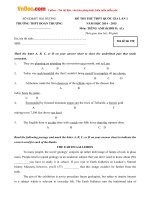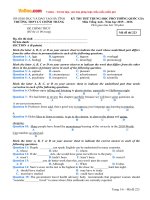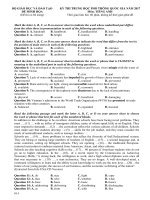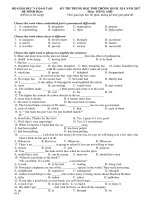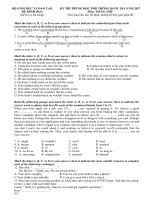ĐỀ THI THỬ THPT QUỐC GIA
Bạn đang xem bản rút gọn của tài liệu. Xem và tải ngay bản đầy đủ của tài liệu tại đây (144.31 KB, 7 trang )
PRACTICE TEST NO 9- 17- 25/9
Mark the letter A, B, C or D on your answer sheet to indicate the word that differs from
the other three in the position of the primary stress in each of the following questions.
Question 1: A. understand
Question 2: A. expand
B. generosity
B. service
C. amputate
C. achieve
D. volunteer
D. migrate
Mark the letter A, B, C, or D on your answer sheet to indicate the word whose underlined
part differs from the other three in pronunciation in each of the following questions.
Question 3: A. how
Question 4: A. cushion
B. cow
B. stumble
C. plow
C. sugar
D. swallow
D. butcher
Mark the letter A, B, C or D on your answer sheet to indicate the underlined part that
needs correction in each of the following questions from 36 to 40.
Question 5: Some of plants in this store require very little care, but this one needs much
more
A
B
C
sunlight than those.
D
Question 6: The product that you bought at lower price is more inferior than the one that
we sell at a
A
B
C
slightly higher price.
D
Question 7: It was essential that the students must be informed about the schedule.
A
B
C
D
Mark the letter A, B, C or D on your answer sheet to indicate the correct answer to each
of the following questions.
Question 8: After the car crash last night, all the injured _______ to hospital in an
ambulance.
A. were rushed
B. were rushing
C. was rushing
D.
was
rushed
Question 9: He is coming _______ a cold after a night out in the rain.
A. away from
B. up with
C. across with
D.
down with
Question 10: ______ every major judo title, Mark retired from international competition.
A. When he won
B. Having won
C. Winning
D. On
winning
Question 11: The man has a ________face and looks exhausted. He _______ hard in the
field.
1
A. beaten-weather/had worked
B.
weather-beaten/must
have worked
C. weather-resistant/must be working
D. fair weather/can’t have
worked
Question 12: Their sons _________ for reasons of economic hardship and personal
insecurity following political harassment.
A. migrates
B. migrated
C. overloaded
D. overloads
Question 13: The ____ cheered when the final goal was scored in the match today.
A. spectators
B. onlookers
C. viewers
D. audience
Question 14: The sudden expansion of heated air associated with lightning produces
______ often heard during a storm.
A. the rumbling sound, thunder, that
B. the rumbling sound, thunder is
C. thunder is the rumbling sound
D. thunder, the rumbling sound
Question 15: ……………..his advice, I would never have got the job.
A. But for
B. Apart from
C. As for
D.
Except
Question 16: She passed the National High School Graduation Exam with
……………colors.
A. bright
B. flying
C. red
D. excellent
Question 17: …………….we need more practice is quite clear.
A. What
B. When
C. That
D.
Which
Question 18: It is interesting to take _____ a new hobby such as collecting stamps or going
fishing.
A. on
B. in
C. over
D. up
Question 19: It is crucial that city dwellers _________rural people.
A. will not look down on
B. not look their nose at
C. must not look down on
D. not look down their nose
at
Mark the letter A, B, C or D on your answer sheet to indicate the most suitable response
to complete each of the following exchanges.
Question 20: Susan: “Is there anything I can do for you, Sir?”
Carl “ ________”.
A. Sure, go ahead.
B. OK, your time.
C. Not now. Thanks anyway.
D. Yes, you are welcome.
Question 21: Debbie: “Well, all the best if I don’t see you before you leave.”
Katy: “________”
A. Oh, no, I don’t think so
B. Thank you. The same to you.
C. Never mind
D. Not at all.
2
Mark the letter A, B, C, or D on your answer sheet to indicate the word(s) OPPOSITE
in meaning to the underlined word(s) in each of the following questions.
Question 22: Names of people in the book were changed to preserve anonymity.
A. cover
B. conserve
C. presume
D. reveal
Question 23: In some countries, the disease burden could be prevented through
environmental improvements.
A. something to entertain
B. something enjoyable
C. something sad
D. something to suffer
Mark the letter A, B, C, or D on your answer sheet to indicate the word(s) CLOSEST in
meaning to the underlined word(s) in each of the following questions.
Question 24: It takes roughly 4,000 pounds of petals to make a single pound of rose oil.
A. as much as
B. more or less
C. amazingly
D. relatively
Question 25: Although monkeys occasionally menace their enemies, they are usually not
dangerous unless they are provoked.
A. consume
B. threaten
C. kill
D. pursue
Mark the letter A, B, C, or D on your answer sheet to indicate the sentence that is closest
in meaning to the sentence given in each of the following questions.
Question 26: The demand was so great that they had to reprint the book immediately.
A. So was the demand for the book that they had to reprint the book immediately.
B. So great the demand was for the book that they had to reprint it immediately.
C. Such was the demand for the book that they had to reprint it immediately.
D. Such great was the demand for the book that they had to reprint it immediately.
Question 27: “I would be grateful if you could send me further details of the job,” he said
to me.
A. He thanked me for sending him further details of the job.
B. He flattered me because I sent him further details of the job.
C. He politely asked me to send him further details of the job.
D. He felt great because further details of the job had been sent to him.
Question 28: People say that Mr. Brown donated nearly a million pounds to charity last
year.
A. Nearly a million pounds was said to have been nearly a million donated to charity
by Mr. Brown last year.
B. Mr. Brown is said to have donated nearly a million pounds to charity last year.
C. Nearly a million pounds is said to be donated to charity by Mr. Brown last year.
D. Mr. Brown was said to have donated nearly a million pounds to charity last year.
Mark the letter A, B, C, or D on your answer sheet to indicate the sentence that best
combines each pair of sentences in the following questions.
Question 29: We arrived at the airport. We realized our passports were still at home.
A. It was until we arrived at the airport that we realize our passports were still at home.
3
B. We arrived at the airport and realized that our passports are still at home.
C. Not until had we arrived at the airport, we realized our passports were still at home.
D. Not until we arrived at the airport did we realize that our passports were still at
home.
Question 30: The referee brought the football game to a halt. He blew his whistle.
A.
B.
C.
D.
The referee brought the football game to a halt by blowing his whistle.
The referee stopped playing football and blowing his whistle.
Having stopped the football match, the referee blew his whistle.
The referee stopped the football game before he blew his whistle.
Read the following passage and mark the letter A, B, C, or D on your answer sheet to
choose the word or phrase that best fits each of the numbered blanks from 31 to 35.
All sorts of sportspeople say that there are great benefits to be gained from
exercising to music. It’s an opinion which is shared by sports scientists at London
University who have been studying the (31) ______ of music on exercise performance.
They have now proved that listening to motivating tunes can help people to get fit quicker.
They discovered that right tunes not only inspire people to start exercising in the first place,
but also enable them to (32) _______ out for longer. Music can calm someone down after
a stressful day, so that they are more in the mood to exercise. But also, (33) ______ on the
rhythm of music helps people to keep going when they are getting tired.
The researchers attended gyms in various countries to observe the reactions of
different age groups to different types of music. Interestingly, they found that it is the music
that people (34) ______ with their youth that inspire them most. The researchers also
visited international athletics meetings, and found that music can also help (35) ______
athletes to perform to a higher standard . Before and during the competition, it can bring
about vital changes to their metal state, which can mean the difference between winning
and losing.
Question 31: A. effects
B. force
C. results
D. significance
Question 32: A. wear
B. work
C. draw
D. make
Question 33: A. concentrating
B. thinking
C. visualizing
D. reflecting
Question 34: A. combine
B. join
C. associate
D.accompany
Question 35: A. head
B. chief
C. top
D. upper
Read the following passage and mark the letter A, B, C, or D on your answer sheet to
indicate the correct answer to each of the questions from 36 to 42.
The first two decades of this century were dominated by the microbe hunters. These
hunters had tracked down one after another of the microbes responsible for the most
dreaded scourges of many centuries: tuberculosis, cholera, diphtheria. But there remained
some terrible diseases for which no microbe could be incriminated: scurvy, pellagra,
rickets, beriberi. Then it was discovered that these diseases were caused by the lack of
vitamins, a trace substance in the diet. The diseases could be prevented or cured by
4
consuming foods that contained the vitamins. And so in the decades of the 1920’s and
1930’s, nutrition became a science and the vitamin hunters replaced the microbe hunters.
In the 1940’s and 1950’s, biochemists strived to learn why each of the vitamins was
essential for health. They discovered that key enzymes in metabolism depend on one or
another of the vitamins as coenzymes to perform the chemistry that provides cells with
energy for growth and function. Now, these enzyme hunters occupied centre stage.
You are aware that the enzyme hunters have been replaced by a new breed of hunters
who are tracking genes- the blueprints for each of the enzymes- and are discovering the
defective genes that cause inherited diseases - diabetes, cystic fibrosis. These gene hunters,
or genetic engineers, use recombinant DNA technology to identify and clone genes and
introduce them into bacterial cells and plants to create factories for the massive production
of hormones and vaccines for medicine and for better crops for agriculture. Biotechnology
has become a multibillion-dollar industry.
In view of the inexorable progress in science, we can expect that the gene hunters
will be replaced in the spotlight. When and by Whom? Which kind of hunter will dominate
the scene in the last decade of our waning century and in the early decades of the next? I
wonder whether the hunters who will occupy the spotlight will be neurobiologists who
apply the technique of the enzyme and the gene hunters to the function of the brain. What
to call them? The headhunters. I will return to them later.
Question 36: What is the main topic of the passage?
A. The microbe hunters
B. The potential of genetic engineering
C. The progress of modern medical researchD. The discovery of enzymes.
Question 37: The word “which” in line 3 refers to _________ .
A. diseases
B. microbe
C. cholera
D. diphtheria
Question 38: The word “incriminated” in the line 4 is closest in meaning to ________ .
A. investigated
B. blamed
C. eliminated
D. produced
Question 39: Which of the following can be cured by a change in diet?
A. tuberculoses
B. cholera
C. cystic fibrosis
D. pellagre
Question 40: How do vitamins influence health?
A. They are necessary for some enzymes to function.
B. They protect the body from microbes.
C. They keep food from spoiling.
D. They are broken down by cells to produce energy.
Question 41: The phrase “occupy the spotlight” in lines 21-22 is closest in meaning to
________ .
A. receive the most attention
B. go the furthest
C. conquer territory
D. lighten the load
Question 42: The author implies that the most important medical research topic of the
future will be __________.
A. the functions of the brains
B. inherited diseases
C. the operation of vitamins
D. the structures of genes
5
Read the following passage and mark the letter A, B, C, or D on your answer sheet to
indicate the correct answer to each of the questions from 43 to 50.
Very few people in the modern world obtain their food supply by hunting and gathering
in the natural environment surrounding their homes. This method of harvesting from
nature’s provision is the oldest known subsistence strategy and has been practiced for at
least the last two million years. It was, indeed, the only way to obtain food until
rudimentary farming and the domestication of wild animals were introduced about 10,000
years ago.
Because hunter- gatherers have fared poorly in comparison with their agricultural
cousins, their numbers have dwindled, and they have been forced to live in marginal
environments, such as deserts and arid wastelands. In higher latitudes, the shorter growing
seasons have restricted the availability of plant life. Such conditions have caused a greater
dependence on hunting, and on fishing along the coasts and waterways. The abundance of
vegetation in the lower latitudes of the tropics, on the other hand, has provided a greater
opportunity for gathering a variety of plants. In short, the environmental differences have
restricted the diet and have limited possibilities for the development of subsistence
societies.
Contemporary hunter- gatherers may help us understand our prehistoric ancestors. We
know from the observation of modern hunter-gatherers in both Africa and Alaska that a
society based on hunting and gathering must be very mobile. While the entire community
camps in a central location, a small party harvests the food within a reasonable distance
from the camp. When the food in the area has become exhausted, the community moves
on to exploit another site. We also notice seasonal migration patterns evolving for most
hunter-gatherers, along with a strict division of labor between the sexes. These patterns of
behavior may be similar to those practiced by mankind during the Paleolithic Period.
Question 43: The word “domestication” in the first paragraph mostly means.............
A. adapting animals to suit a new working environment
B. hatching and raising new species of wild animals in the home
C. teaching animals to do a particular job or activity in the home
D. making wild animals used to living with and working for humans
Question 44: According to the passage, subsistence societies depend mainly on..........
A. hunter- gathers’ tools
B. nature’s provision
C. farming methods
D. agricultural products
Question 45: The word “marginal” in the second paragraph is closest in meaning to.......
A. disadvantaged
B. suburban
C. forgotten
D. abandoned
Question 46: In the lower latitudes of the tropics, hunter – gatherers...............
A. can free themselves from hunting
B. have better food gathering from nature
C. live along the coasts and waterways for fishing
D. harvest shorter seasonal crops
6
Question 47: The word conditions in the second paragraph refers to ...........................
A. the places where plenty of animals and fish can be found
B. the situations in which hunter- gatherers can grow some crops
C. the environments where it is not favorable for vegetation to grow
D. the situations in which hunter- gatherers hardly find anything to eat.
Question 48: A typical feature of both modern and prehistoric hunter- gatherers is
that...................
A. they live in the forests for all their life
B. they don’t have a healthy and balanced diet
C. they don’t have a strong sense of community
D. they often change their living places
Question 49: According to the passage, which of the following is NOT mentioned?
A. Harvesting from the natural environment had existed long before farming was taken up
B. The environmental differences produce no effect on subsistence societies
C. The number of hunter- gatherers decreases where farming is convenient.
D. Hunting or fishing develops where there are no or short growing seasons
Question 50: Which of the following would serve as the best title of the passage?
A. Hunter – gatherers and Subsistence Societies.
B. Evolution of Humans’ Farming Methods.
C. A Brief History of Subsistence Farming.
D. Hunter- gatherers: Always on the Move.
The end.
7



